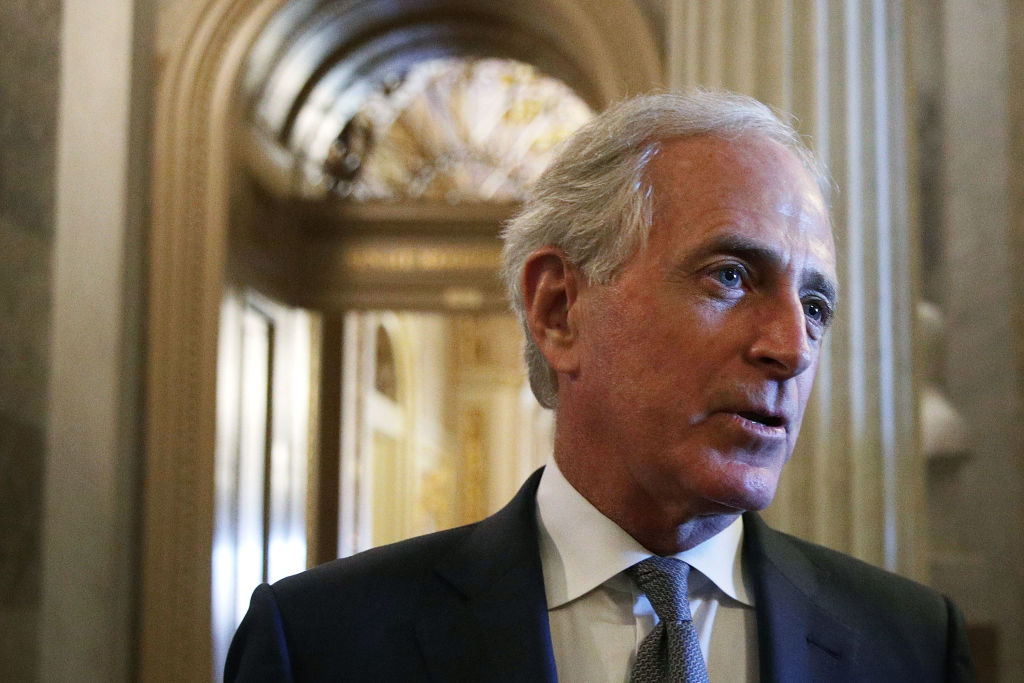Sen. Bob Corker wants to know how a measure enriching him was slipped into the GOP tax bill he now supports


A free daily email with the biggest news stories of the day – and the best features from TheWeek.com
You are now subscribed
Your newsletter sign-up was successful
On Friday, Sen. Bob Corker (R-Tenn.) announced that he will vote for the final Republican tax bill being rushed through Congress, despite his lone GOP no vote when it passed in the Senate. His original concern was the $1 trillion or more the bill will add to the federal deficit — the Congressional Budget Office on Friday put the final deficit hole at $1.455 trillion over 10 years — but Corker said Friday the imperfections are worth helping U.S. businesses. On Friday night, the International Business Times found a newly added provision that would open big tax breaks to real estate developers like President Trump, Jared Kushner, and Corker.
On Saturday, Corker insisted he had not known about the "Corker kickback" before he switched his vote. On Sunday, he asked Senate Finance Committee Chairman Orrin Hatch (R-Utah) for an explanation. "The suggestion was that it was airdropped into the conference without prior consideration by either the House or the Senate," Corker said. "Because this issue has raised concerns, I would ask that you provide an explanation of the evolution of this provision and how it made it into conference report. I think that because of many sensitivities, clarity on this issue is very important."
Senate Majority Whip John Cornyn (R-Texas) provided something of an explanation on ABC's This Week, telling host George Stephanopoulos the measure was added in during "a very intense process" where "the Democrats refused to participate, and what we've tried to do is cobble together the votes we needed to get this bill passed."
The Week
Escape your echo chamber. Get the facts behind the news, plus analysis from multiple perspectives.

Sign up for The Week's Free Newsletters
From our morning news briefing to a weekly Good News Newsletter, get the best of The Week delivered directly to your inbox.
From our morning news briefing to a weekly Good News Newsletter, get the best of The Week delivered directly to your inbox.
It's possible specifically helping real estate LLCs was incidental, as the new provision "combined a capital-investment approach that the House favored with the Senate's tax-cut mechanism," Bloomberg reports. But while "the new law will include lots of what you might call unintended consequences," Axios says, noting how it might increase moving U.S. factories overseas, "often they were intended by the hidden hands that put them there."
A free daily email with the biggest news stories of the day – and the best features from TheWeek.com
Peter has worked as a news and culture writer and editor at The Week since the site's launch in 2008. He covers politics, world affairs, religion and cultural currents. His journalism career began as a copy editor at a financial newswire and has included editorial positions at The New York Times Magazine, Facts on File, and Oregon State University.
-
 What is the endgame in the DHS shutdown?
What is the endgame in the DHS shutdown?Today’s Big Question Democrats want to rein in ICE’s immigration crackdown
-
 ‘Poor time management isn’t just an inconvenience’
‘Poor time management isn’t just an inconvenience’Instant Opinion Opinion, comment and editorials of the day
-
 Bad Bunny’s Super Bowl: A win for unity
Bad Bunny’s Super Bowl: A win for unityFeature The global superstar's halftime show was a celebration for everyone to enjoy
-
 TikTok secures deal to remain in US
TikTok secures deal to remain in USSpeed Read ByteDance will form a US version of the popular video-sharing platform
-
 Unemployment rate ticks up amid fall job losses
Unemployment rate ticks up amid fall job lossesSpeed Read Data released by the Commerce Department indicates ‘one of the weakest American labor markets in years’
-
 US mints final penny after 232-year run
US mints final penny after 232-year runSpeed Read Production of the one-cent coin has ended
-
 Warner Bros. explores sale amid Paramount bids
Warner Bros. explores sale amid Paramount bidsSpeed Read The media giant, home to HBO and DC Studios, has received interest from multiple buying parties
-
 Gold tops $4K per ounce, signaling financial unease
Gold tops $4K per ounce, signaling financial uneaseSpeed Read Investors are worried about President Donald Trump’s trade war
-
 Electronic Arts to go private in record $55B deal
Electronic Arts to go private in record $55B dealspeed read The video game giant is behind ‘The Sims’ and ‘Madden NFL’
-
 New York court tosses Trump's $500M fraud fine
New York court tosses Trump's $500M fraud fineSpeed Read A divided appeals court threw out a hefty penalty against President Trump for fraudulently inflating his wealth
-
 Trump said to seek government stake in Intel
Trump said to seek government stake in IntelSpeed Read The president and Intel CEO Lip-Bu Tan reportedly discussed the proposal at a recent meeting
